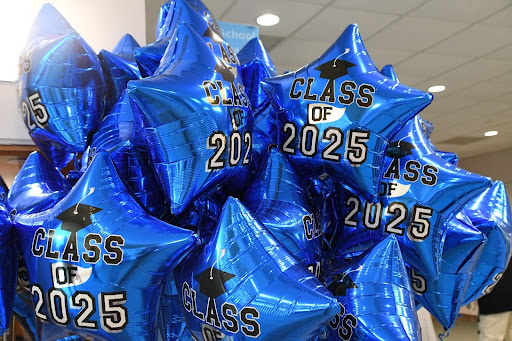Tabitha Giacalone, College Transition & Success Coordinator
Supporting Our Graduates Beyond Graduation – Because College Success Shouldn’t Be Left to Chance

Each spring, we watch McLean School seniors walk across the stage filled with pride, excitement, and anticipation for what lies ahead. And yet, for many students, the transition from high school to college brings more complexity than expected.
The truth is, starting college is not the same as succeeding in college.
Nationally, nearly 1 in 5 first-year college students do not return for their second year. Among full-time students who entered college in fall 2023, only 69.5% were still enrolled at the same institution a year later. And for Black, Hispanic, and Native American students, retention rates are even lower than the national average: 58.5%, 65.4%, and 56.0%, respectively. These numbers reflect more than just statistics; they represent bright, capable students who lose momentum, motivation, or access to the support they need to succeed.
In direct response to this, the McLean School has created a new position designed to extend our commitment to student success beyond graduation, and I am excited to be in this role.
As the School’s first College Transition and Success Coordinator, my responsibility is to ensure that our graduates are not only ready for college but also ready to thrive in college, and to stay connected with them throughout their postsecondary journey. I’ll be working closely with students before and after they graduate to provide coaching, connection, and continuity during this critical life transition.
Why This Role Matters Now
We know from decades of research and from personal stories shared by our alums that succeeding in college isn’t just about academic readiness. It’s about:
- Knowing how to self-advocate in a new environment.
- Staying organized and focused in the face of unstructured time.
- Building a support system when you don’t know anyone yet.
- Managing the emotional challenges that come with independence, identity, and stress.
- Navigating setbacks and sustaining motivation through new challenges.
- Forming connections with others to build relationships and avoid isolation.
Even though colleges and universities offer numerous resources, students often struggle to know where to start or how to effectively manage everything on their plates. Nationally, 60% of college students don’t fully understand the services available to them on campus, such as peer mentoring, success coaching, or wellness services. And while 58% of institutions offer student success coaching, many students never access it; often because they don’t know it exists, or don’t know how to ask for it.
That’s where I come in.
Coaching, Connection, and Continuity
My work with students starts before they leave McLean. Through workshops, one-on-one relationship building, and practical skills development, I will support students with developing habits they’ll need to succeed in college. Together, we explore everything from time management and planning large projects to effective communication with professors and establishing routines for holistic well-being.
Once students arrive on campus, I’ll stay in touch, offering individualized, strengths-based support to help them navigate academic systems, advocate for their needs, manage their commitments, and connect with campus resources. They also receive regular check-ins, accountability support, and access to a familiar, trusted adult who understands their learning profile and personal goals.
Through this model, we help students develop essential skills in self-advocacy, resilience, and problem-solving, all while building their confidence and independence.
Centering Mental Health and Wellness
We also recognize the critical importance of mental health and equity in student success. As a community that deeply values emotional well-being, we can’t ignore the mental health crisis that’s affecting college students nationwide. National studies continue to show alarming rates of depression, anxiety, and stress among college students, especially those managing learning differences or coming from underrepresented backgrounds. Recent research shows that:
- 44% of students report symptoms of depression
- 37% report experiencing anxiety
- And 15% have considered suicide, the highest number in the history of the Healthy Minds Study
Students with ADHD, dyslexia, and executive functioning challenges often feel even more isolated, especially when the scaffolding of support they had in high school is suddenly gone.
By keeping the McLean connection alive, my hope is that students will know they’re never alone and that asking for help is a sign of strength, not a weakness.
Our goal isn’t just to help students “make it through”; it’s to support their growth into capable, self-aware, and connected young adults. The College Transition and Success (CTS) program accomplishes this through eight focus areas:
- Academic Success
- Managing Commitments
- Connections
- Health & Well-Being
- Finances
- Career & Completion
- Effectiveness
- Resource Navigation
Each is designed to help students meet challenges with clarity and support.
Success on Their Terms
At McLean, we believe college success should be defined by each student, whether that’s earning a degree, discovering a passion, or learning how to navigate life with confidence. Through the College Transition and Success (CTS) Program, we’re making sure no graduate feels like they have to figure it all out alone.
As we build out this program, I’ll be:
- Visiting college campuses
- Hosting alum panels, events, and conversations
- Partnering with students and families
- Collecting feedback and data to understand what’s working and where more support is needed
Above all, I’m here to support our students as they define and achieve their own version of success.
Because once a Mustang, always a Mustang.
McLean School, in Potomac, Maryland, with transportation provided across Washington, DC, Maryland, and Northern Virginia, proudly serves bright K-12 students, including those with dyslexia, ADHD, and executive functioning challenges. Learn more at mcleanschool.org.